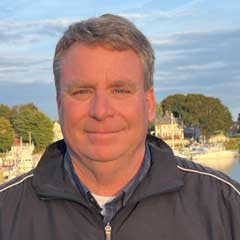- Deputy Superintendent
- Providence Parks Department
- Email: Bbyrnes@providenceri.gov
Brian F. Byrnes, CSI, CPSI - Deputy Superintendent, Providence Parks Department, holds a degree in Urban Planning from the University of Rhode Island. Brian has over 30 years of experience as a contractor for a site work and landscape construction contractor in Rhode Island. Throughout his career, he has participated in the construction of over 400 stormwater retrofits and drainage projects as well as hundreds of other municipal projects. As Deputy Superintendent, his main responsibility is to oversee the design and construction of projects throughout the Providence Parks system (122 parks), focusing on engaging the community and creatively using resources to make unique and sustainable community spaces. In addition he oversees all Parks Department operations for 135+ employees throughout the parks system. Brian is a Certified Playground Safety Inspector, a Certified Stormwater Inspector a founding member of the Providence Stormwater Innovation Center an Audubon 2021 Partner of the Year and 2022 EPA Environmental Merit Award Winner.
As Deputy Superintendent of the Providence Parks Department I am responsible for the maintenance and infrastructure improvements for 122 city parks. The largest of those parks is Roger Williams Park (RWP) which is 435 acres with 7 lakes (100 acres). In addition, we have India Point Park along the Providence River, Mashapaug Pond, Riverside Park along the Woonasquatucket River and Waterplace Park extending the providence river into the center of downtown – along with many parks adjacent to sensitive ecosystems.
With every operation we consider the impact to the environment, whether it’s our maintenance practices or designing a renovation in a park, every employee is made aware of how our operations affect our green infrastructure.
As a founding member of the Stormwater Innovation Center (SIC) we have been able to showcase some of the Best Management Practices (BMP’s) we deploy around the city, particularly in RWP. While RWP provides a “respite from the urban life in the city”, with its natural setting within an urban area, it has become better know as a place of learning. The SIC has grown into a true collaboration of state and municipal organizations, landowners, maintenance personnel, designers, contractors, manufacturers, researchers, educators and regulatory agencies.
Working with the SIC we have been able to install innovative stormwater practices at RWP in a real-world setting, resulting in the opportunity to monitor efficacy and provide lessons learned on practices from design through maintenance. In addition, we are working in school systems to bring awareness to the growing environmental issues of our time taking those lessons from inside the classroom and into RWP.
Currently we are working on getting a better understanding of shoreline resiliency at India Point Park, sea level rise issues in Waterplace Park, cyano-bacteria blooms in RWP and their affects in an urban area with an underserved population. This year we are proud to have RWP named a Coastal Institute Demonstration Site and are looking forward to the results of the many, ongoing research projects in the park.
Lastly, the state and region are in desperate need of a qualified work force for the maintenance of green infrastructure. The SIC is moving to develop a certification for stormwater maintenance workers to insure proper techniques and procedures in stormwater maintenance – for the future of our natural spaces.

